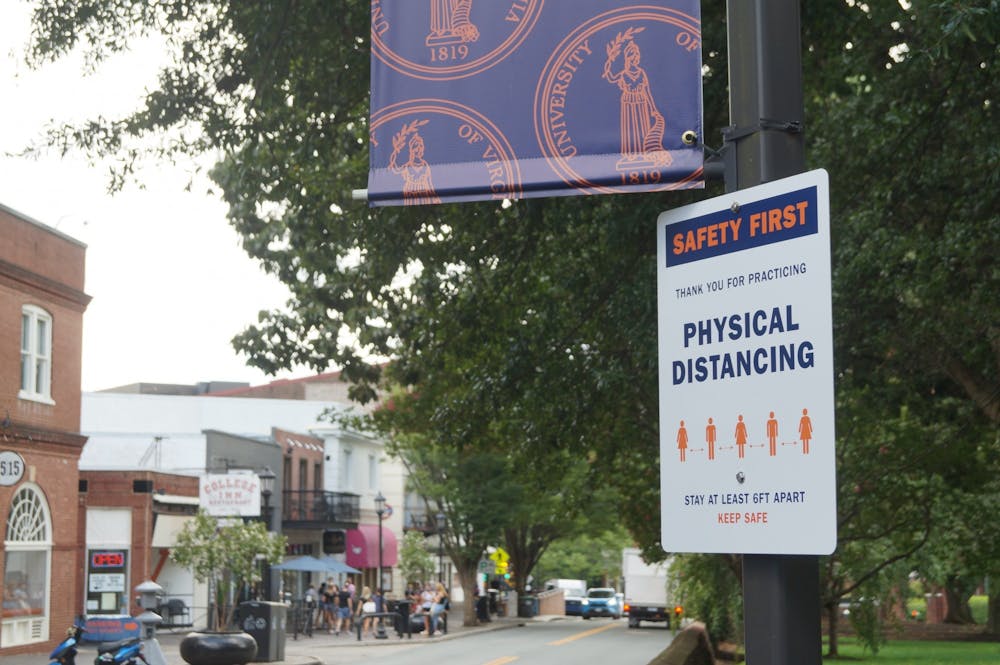Despite several universities closing their doors to students following public health concerns, the University still plans to welcome back thousands of students and faculty to Charlottesville this week. The University has already reported 115 positive COVID-19 cases within the community since Aug. 17 — all before the majority of students living on-Grounds have returned. Even as the number of positive cases in the community increases by the day, the University remains committed to reopening with partial in-person instruction Sept. 8 — a plan that will bring an additional 4,000 undergraduate students to on-Grounds residence halls. In these next few weeks, as students continue to receive warnings from the University administration about how they are to blame for the inevitable spike in COVID-19 cases, it is important to remember who ignored the signs and made the final call.
We’ve already seen the outcomes of other schools’ reopening plans. For example, look no further than the University of North Carolina at Chapel Hill, which saw a dozen clusters surface and over 32.3 percent of students who were tested having positive results by the second week of its school year. It is difficult to imagine that the University’s plan will fare any differently when classes begin. Here, we must wonder — is the risk of finding out worth it?
The University should not be betting on lives.
Obviously, this pandemic is an unprecedented situation for any university administration. Nevertheless, our administration owes it to the University and Charlottesville communities to play it safe in the middle of a global pandemic. Still, the University is continuing with a plan several community groups have publicly and staunchly opposed. Charlottesville Mayor Nikuyah Walker called the plan a “recipe for disaster,” and the Charlottesville Human Rights Commission plans to send a letter to University President Jim Ryan voicing their concerns about U.Va.’s reopening. The bridges President Ryan claims to have built with the Charlottesville community are already crumbling.
In a recent email, the University plainly stated that “A successful return to Grounds does not mean totally eliminating the risk of COVID-19 infections.” So, what is a successful return? Clearly, University leadership knows students will spread the virus — it has already forced hundreds of students to relocate in order to create additional quarantine housing. The University would be naïve to claim that they are doing everything in their power to keep students safe while simultaneously admitting that these risks exist.
For many, being in an environment in which the risk for infections exists is life or death. Charlottesville is not populated solely by healthy young adults who may be at lower risk for COVID-19. Pretending that the virus will remain isolated ignores the health risks that immunocompromised students, older professors, essential workers and community members will be forced to navigate. Students and faculty have the option to stay home — for residents of Charlottesville, this is their home.
Even without irresponsible student behavior, the University’s plan to reopen already poses far too many threats to Charlottesville and the U.Va. community. Bringing students back to Grounds in any capacity places the University at an elevated risk for being the center of a new outbreak. Charlottesville City Public Schools will not hold in-person classes for the first quarter of the school year — leaving the University’s decision to reopen with more students, faculty and staff as counterproductive to these efforts.
We are worried for the health and safety of the University’s employees who will be forced to work in an environment with students who continue to go to parties and bars. We are worried for the community members that will be forced to take extra safety precautions due to the inevitable spike in cases that Charlottesville will soon see. We are worried for the students who will find themselves sick just because they showed up to class. Now, we are forced to ask ourselves a series of crucial questions — how many community members must become infected before the University decides to shut down? Whose lives will be collateral damage in the University’s ill-fated reopening experiment?
We know that these infections and deaths are coming — and when they do, you know whom to blame. We must always hold the University administration accountable.
The Cavalier Daily Editorial Board is composed of the Executive Editor, the Editor-in-Chief, the two Opinion Editors, their Senior Associate and an Opinion Columnist. The board can be reached at eb@cavalierdaily.com.







